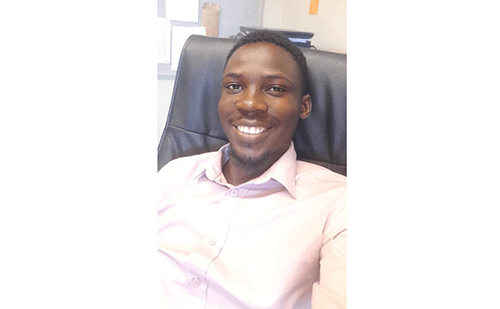Lahja Nashuuta
Kazara Ndovazu does not see himself as just another face behind a government desk. He is part of a generation of young Namibians determined to reshape public service to make it more effective, more responsive, and more impactful. Born and raised in the town of Opuwo in the Kunene region, Ndovazu knows the realities of hardship and limited opportunities. Yet, he refuses to be defined by such.
“My roots are in Opuwo,” he said firmly. “It’s where I learned to survive, to push forward, and stay grounded. Life wasn’t easy, but it taught me discipline and resilience, two qualities I carry with me every day,” he said.
Today, Ndovazu serves as an administrative officer in the Ministry of Justice and Labour Relations. His journey into public service, however, was not a straight path. As a child, he dreamed of becoming a journalist, inspired by the voices he saw boldly asking questions and exposing the truth.
“I looked up to journalists like Shinovene Immanuel, Edward Mumbuu, and Lazarus Amukeshe,” he recalls. “They gave people a voice, challenged authority and brought issues to the surface. I wanted to be part of that,” he said.
This dream led him to study at the Namibia University of Science and Technology (NUST), where he earned his bachelor’s degree. Though he didn’t end up in a newsroom, it was at university and during internship at the Ministry of Information and Communication Technology that his mindset shifted.
“That internship was an eye-opener,” he said. “I saw firsthand how government communication connects leadership to citizens. It’s more than announcements, it’s about transparency, access to information and building trust. That’s when I made the decision that I want to serve my country through the public sector,” he said.
He revealed that joining public service was not immediate. Like many graduates, Ndovazu battled unemployment for a time. But in May 2024, his persistence was rewarded with a permanent position in the civil service, a role he said to honour and take seriously.
“My dream of being a journalist didn’t come true,” he reflects, “but I haven’t lost the core purpose. I still serve. I still impact lives. And in many ways, this role gives me a broader platform to help people,” he maintained.
In his current role, Ndovazu oversees a range of responsibilities ranging from procurement and transport logistics to stock control, revenue collection and managing institutional information.
“This job demands focus, discipline and high-level organisation,” he said. “I’m not just pushing paper. I’m ensuring that systems work, that resources reach the right places, and that public funds are used effectively.”
What drives him most is service, the ability to help. “Every time I assist someone whether it’s a colleague or a member of the public, I’m reminded why I do this. I want people to walk away knowing they were heard and helped,” said Ndovazu.
He acknowledges the structural challenges that come with working in government. Chief among them: bureaucracy.
“Procedures are necessary, we need accountability. But there are times when the system moves too slowly, especially when urgent action is required. It can be frustrating,” he admitted.
“But instead of complaining from the outside, I’ve chosen to be inside, where I can contribute to improving how things work,” he said.
During the interview, Ndovazu was also vocal about changing public perceptions about civil servants.
“There’s this stereotype that government workers are lazy, that we’re just there for the paycheck,” he said. “But that’s not my reality. I know many who work long hours, meet performance targets, and go the extra mile. We are governed by quarterly performance agreements, and we’re held to standards. I hold myself to even higher ones,” he confidently stated.
For Ndovazu, public service is more than a stable job.
“Yes, job security and stability matter especially for someone like me who comes from a background where nothing is guaranteed. But I’m not here to hide behind that. I’m here because I believe in the work. I want to contribute to something bigger than myself,” he said.
Looking ahead
Ndovazu is clear and assertive about his goals. “I’m not here to stay in one position. I want to grow, take on more responsibilities, and become a leader who delivers.
My aim is to help improve service delivery, rebuild public trust, and be part of a results-driven government culture,” he said.
His message to fellow young Namibians is equally direct.
“Don’t sit back and complain but get involved. We need a generation of public servants who care, who show up, and who deliver,” said Ndovazu.
Asked how he wants to be remembered, Ndovazu did not hesitate.
“I want to be known not just as a government employee, but as someone who served with integrity, who helped improve people’s lives, and who left the system better than he found it.”
lnashuuta@nepc.com.na



